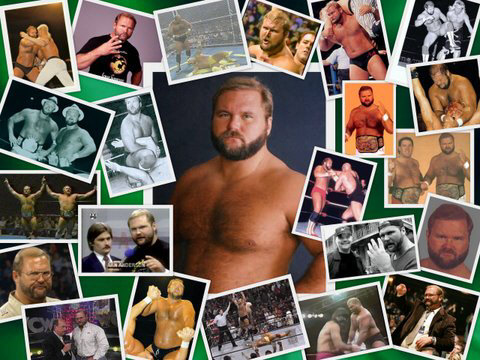by Dick Bourne
Mid-Atlantic Gateway
On a recent episode of ARN, the terrific podcast with Conrad Thompson on Cumulus/Westwood One and Ad Free Shows, Arn Anderson spoke about the early days of the Four Horsemen. The context was his early association with Ole Anderson and how that association legitimized Arn early in his career.
During a recent "Ask Arn Anything" episode, a question about Arn's early family relationship with Ole Anderson and Ric Flair (a storyline that dated back to 1974 with Flair and the Anderson family), led Arn down the path of talking about what that "cousin" association with, not only Ric Flair, but with Ole Anderson in particular, meant to his career at that point, but also to the early formation of the Horsemen. "Ole was a huge part as far as giving us credibility off the get-go. He gave me credibility off the get-go," Arn told Conrad. "He helped give us a launching pad," Arn said, for what became the legendary force that was the Four Horsemen.| The Enforcer, "Doube A" Arn Anderson One-half of the National Tag Team Champions with Ole Anderson (Eddie Cheslock Photo) |
And while "the Rock" (Ole's longtime nickname, long before that other guy named the Rock came along) served as part of the foundation of the Horsemen for only it's first full year, that foundation he helped build proved firm enough for him to walk away and leave a valuable spot open for younger, perhaps hungrier members to take his place, including Lex Luger in 1987 and Barry Windham in 1988.
Ole Anderson Returns to Full Time Action
Ole forming the team with Arn in the spring of 1985 meant a return to full time action in the ring. He had been retired from full time wrestling since the summer of 1983 when he devoted all of his energy into booking and promoting Georgia Championship Wrestling, in which was part owner, and later his own Georgia-based promotion after the takeover of the long-standing Georgia NWA office by the WWF that is part of the legend of Black Saturday. He wrestled sporadically in 1984 and early 1985, but more as a special attraction than as a regular part of any program or storyline. But when Jim Crockett, Jr. bought the TV time on the SuperStation in the spring of 1985 and basically absorbed Ole's struggling promotion, Ole committed to returning ot the ring full-time and finishing out the year of 1985, working to recoup some of his lost fortune that he has sunk into his promotion, but also to help develop Arn Anderson as a star for booker Dusty Rhodes. That later blossomed organically into the Four Horsemen with Ric Flair, Tully Blanchard and James J. Dillon. Ole took the late winter and spring of 1986 off to follow his son Bryant's amateur wrestling career. Business was so good for Jim Crockett Promotions that Ole came back for the balance of 1986 full-time as part of an amazing boom period for JCP. That would be his last full-time stint working in the ring, although he did come back for a part-time run, teaming with Arn in Ted Turner's WCW in late 1989 and 1990 as part of a reformation of the Horsemen.
"He was at the end of his career," Arn said on his podcast of his run with Ole in 1985. "He made that pretty clear when he
came back (to working a full schedule in 1985). He wasn't going to wrestle for years, but he helped give us a
launching pad."
 |
| Photo collage courtesy Mike Cline, Mid-Atlantic Grapplin' Greats |
Arn Anderson's Launching Pad
Ole Anderson providing a launching pad for Arn actually had it's roots two years earlier. Arn has spoken often about Ole launching his career into the big time by making him an Anderson in April of 1983, when Marty Lunde was dubbed Arn Anderson, the nephew of Ole Anderson. Ole (as booker for Georgia) teamed him with second generation wrestler Matt Borne and gave them a push as part of an early version of Paul Ellering's fledgling stable, the Legion of Doom.
Arn kept the Anderson name after leaving Georgia in Spetember of 1983 for the Southeast Wrestling territory (Alabama and panhandle of Florida) run by Ron Fuller, which was booked then by Bob Armstrong who gave Arn his first break as a main-event status wrestler, forming a team with "Mr. Olympia" Jerry Stubbs. The two were frequent Southeastern tag team champions. He made spot appearances back in Georgia during that time, returning to fight his "uncle" Ole Anderson in a few matches, who at that point was the babyface authority figure for Georgia Championship Wrestling. That additional exposure as a main-eventer on the nationally televised WTBS show gave Arn more recognition as a "top guy."
When NWA World Champion Ric Flair toured the Southeastern area, he became friends with Arn and subsequently recruited him to join Jim Crockett Promotions in the spring of 1985, where booker Dusty Rhodes quickly teamed him up with returning Ole Anderson to reform a new Minnesota Wrecking Crew, changing the family relationship to cousins.
The rest is history. How firm a foundation, indeed.
* * * * * *
The episode of the podcast with the discussion about Ole is "Ask Arn Anything #40" which originally aired April 27, 2021 and is available on all podcast platforms as well as the Westwood One website page for Arn's show.
